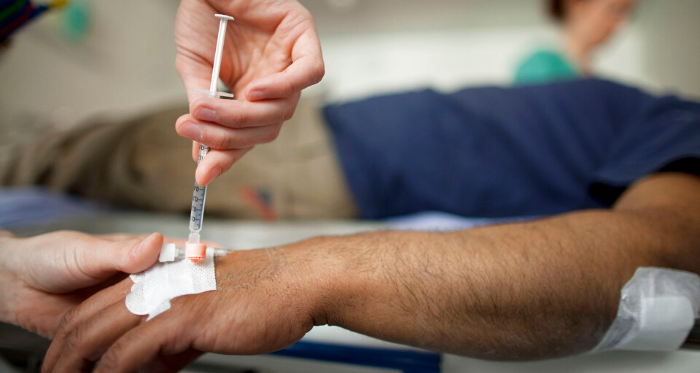
Photo: Niels Aage Skovbo, FOKUS FOTO
03-06-2020
Two Danish National research projects have been granted funding from the Danish Cancer society to study effects of specific medicines on rare blood and bone marrow cancers and soft tissue sarcomas.
Research to improve the treatment of rare cancer diseases can be complicated due to small patient populations. Two research projects receives funding from the Danish Cancer Society to examine and document the effect of specific medicaments on rare and severe cancers in blood and bone marrow as well as soft tissue sarcoma. The studies will collect data and ensure a better basis for decision-making for patients and oncologists.
Myelodysplastic syndrome (MDS), chronic myelomonocystic leukaemia (CMML), and acute myeloid leukaemia (AML) are severe cancers with approximately 250, 50 and 250 diagnosed patients in Denmark annually. Since 2008, patients have been treated with medicaments azacitidine and decitabine that keep the cancer quiescent for a period of time. Unfortunately, a considerable proportion of the patients do not experience the expected effect from the treatment. The recently funded project will study which patient conditions of comorbidity or particular cell mutations that may affect treatment effect.
The project will collect a Danish national compilation of data on azacitidine and decitabine treatment effects among patients with MDS, CMML and AML by using data from patient medical charts and database extractions from the Danish national requistries during the time period 2009-2020. Prospectively, the project will collect data from medical records as well as questionnaire surveys regarding patient-experienced quality of life, side effects and complications. The aim is to improve the current treatment guidelines, so future azacitidine and decitabine based treatments are targeted the patients who will benefit from the treatment. Furthermore, the study is expected to contribute to future research in treatment with these medicaments.
Study of treatment effects for advanced soft tissue sarcomas
The annual incidence of sarcoma in Denmark is approximately 330, and approx. 14% of all sarcoma patients have an incurable illness at the time of diagnosis. The prognosis is particularly poor for aggressive subtypes of sarcoma, and the estimated 5-year survival is approx. 50-60%. The antibody olaratumab was approved for patient treatment in 2016 as a result of a clinical trial on olaratumab in combination with the well-known chemotherapy medicine doxorubicin for palliative treatment of advanced soft tissue sarcoma. The clinical trial found that olaratumab as an addition to chemotherapy treatment prolonged disease control and survival, when comparing to the use of chemotherapy treatment alone.
Olaratumab was removed from the market in 2019 upon the results from a large clinical trial that no longer documented the treatment benefits. However, the trial found a prolonged survival of several months among patients with soft tissue sarcoma, regardless of treatment with olaratumab. This prolonged survival could be due to the fact that all patients in the trial were also receiving treatment with the cardioprotective medication dexrazoxane.
The project will document the state of health of Danish patients with soft tissue sarcoma, who have been treated with olaratumab, based on the effect on disease control, survival and side effects, particularly cardiac side effects. Furthermore, the research project will study how the use of dexrazoxane with doxorubicin chemotherapy impacts treatment. A prospective collection of patient-reported data on treatment effects and side effects will also be carried out.
